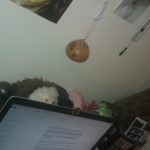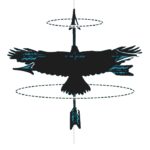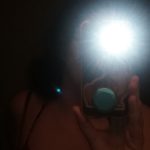 amount of interrupted time—which I really only get at night. But poetry I can write at any time.
My writing rituals are usually music on (and usually a set writing playlist of some sort—which might just be a single song on repeat), cup of coffee or water next to me, and that’s really it. I do keep something to keep my hands busy for when I’m stuck in a rut, which is usually a deck of cards to shuffle or a Jacob’s Ladder (ie the world’s best toy) to play with.
My creative space is my very messy desk at home. There are some monster Funko pops and assorted weird and beloved objects, because I enjoy looking at things that make me smile while I write.
Are there repetitive themes within your writing? Where do you draw inspiration for these themes, and how do you find yourself drawn to them?
Oh very much there are. If I’m any kind of writer, it’s an obsessive one so I find myself returning to the same themes from different angles all the time. My themes are often the long term effects of violence and the way we talk about violence, the dual edged sword of grief and guilt, friendship, sibling relationships, team dynamics, health and bodies, the ways in which we approach things we fear, science, and communication and miscommunication.
Most inspiration is drawn from the day to day. I spend a lot of time in my own head and doing weird train of thought type research—having access to scholarly journals really is the best of all things for me. I have a couple of good friends who will often point me to weird science things and then I’ll fall into the rabbit hole of research from there. I do scholarship into rhetoric of violence and so I’m often thinking about how violence exists and how it is interpreted and used within our society.
I wish I knew why I was drawn to some of them. I feel like I’d definitely prefer to not being thinking about violence and systemic violences so much. Some of them are more clear—I have close friendships, I have three brothers so sibling relationships make sense, etc.
Our goal is to publish absurdly unclassifiable literature. Do you have a favourite piece of writing that goes against the grain?
One of my favorite unclassifiable novels is Glyph by Percival Everett (honestly, a lot of Everett’s writing falls under this category) or any of the stories in Helen Oyeyemi’s What is Not Yours is Not Yours.
What pieces and/or projects are you currently working on?
*laughs sadly* way, way too many. I’ve finished revising my sci-fi novel-in-stories about space exploration, I’m working on a traditionally structured novel, I’m working on the last few sections of a novel about a college basketball team, I have two poetry manuscripts and two poetry chapbooks out on submission right now, I’m working on a collection of flash fiction stories and slightly longer pieces about the Wisconsin Dells, and I’m working on some new poems that feel like they want to be a new collection. Basically, someone needs to have a long talk to me about working on just one project at a time. It wouldn’t work, but they should still have the talk with me.
amount of interrupted time—which I really only get at night. But poetry I can write at any time.
My writing rituals are usually music on (and usually a set writing playlist of some sort—which might just be a single song on repeat), cup of coffee or water next to me, and that’s really it. I do keep something to keep my hands busy for when I’m stuck in a rut, which is usually a deck of cards to shuffle or a Jacob’s Ladder (ie the world’s best toy) to play with.
My creative space is my very messy desk at home. There are some monster Funko pops and assorted weird and beloved objects, because I enjoy looking at things that make me smile while I write.
Are there repetitive themes within your writing? Where do you draw inspiration for these themes, and how do you find yourself drawn to them?
Oh very much there are. If I’m any kind of writer, it’s an obsessive one so I find myself returning to the same themes from different angles all the time. My themes are often the long term effects of violence and the way we talk about violence, the dual edged sword of grief and guilt, friendship, sibling relationships, team dynamics, health and bodies, the ways in which we approach things we fear, science, and communication and miscommunication.
Most inspiration is drawn from the day to day. I spend a lot of time in my own head and doing weird train of thought type research—having access to scholarly journals really is the best of all things for me. I have a couple of good friends who will often point me to weird science things and then I’ll fall into the rabbit hole of research from there. I do scholarship into rhetoric of violence and so I’m often thinking about how violence exists and how it is interpreted and used within our society.
I wish I knew why I was drawn to some of them. I feel like I’d definitely prefer to not being thinking about violence and systemic violences so much. Some of them are more clear—I have close friendships, I have three brothers so sibling relationships make sense, etc.
Our goal is to publish absurdly unclassifiable literature. Do you have a favourite piece of writing that goes against the grain?
One of my favorite unclassifiable novels is Glyph by Percival Everett (honestly, a lot of Everett’s writing falls under this category) or any of the stories in Helen Oyeyemi’s What is Not Yours is Not Yours.
What pieces and/or projects are you currently working on?
*laughs sadly* way, way too many. I’ve finished revising my sci-fi novel-in-stories about space exploration, I’m working on a traditionally structured novel, I’m working on the last few sections of a novel about a college basketball team, I have two poetry manuscripts and two poetry chapbooks out on submission right now, I’m working on a collection of flash fiction stories and slightly longer pieces about the Wisconsin Dells, and I’m working on some new poems that feel like they want to be a new collection. Basically, someone needs to have a long talk to me about working on just one project at a time. It wouldn’t work, but they should still have the talk with me.

 Chloe N. Clark’s poems and fiction appear in Booth, Glass, Hobart, Little Fiction, Uncanny, and more. She is co-EIC of Cotton Xenomorph, writes for Nerds of a Feather, and teaches at Iowa State University. Her debut chapbook, The Science of Unvanishing Objects, is out from Finishing Line Press and she can be found on Twitter @PintsNCupcakes.
Chloe N. Clark’s poems and fiction appear in Booth, Glass, Hobart, Little Fiction, Uncanny, and more. She is co-EIC of Cotton Xenomorph, writes for Nerds of a Feather, and teaches at Iowa State University. Her debut chapbook, The Science of Unvanishing Objects, is out from Finishing Line Press and she can be found on Twitter @PintsNCupcakes.